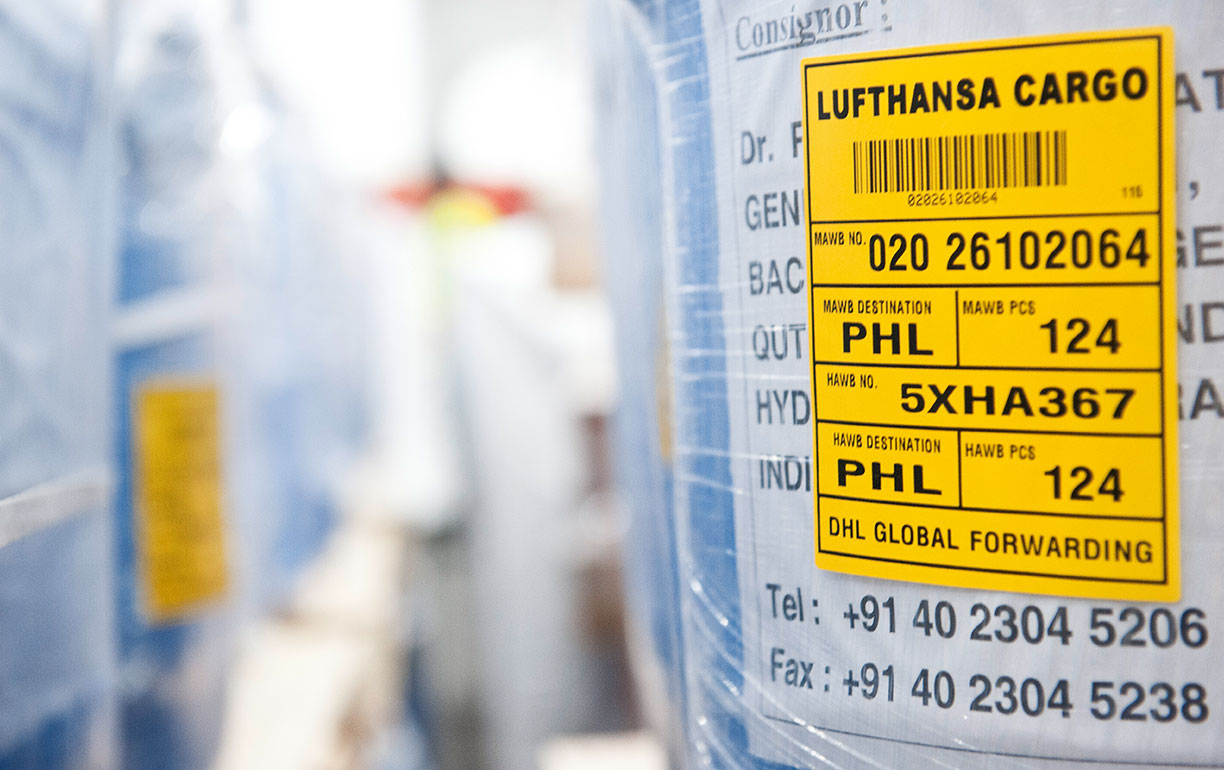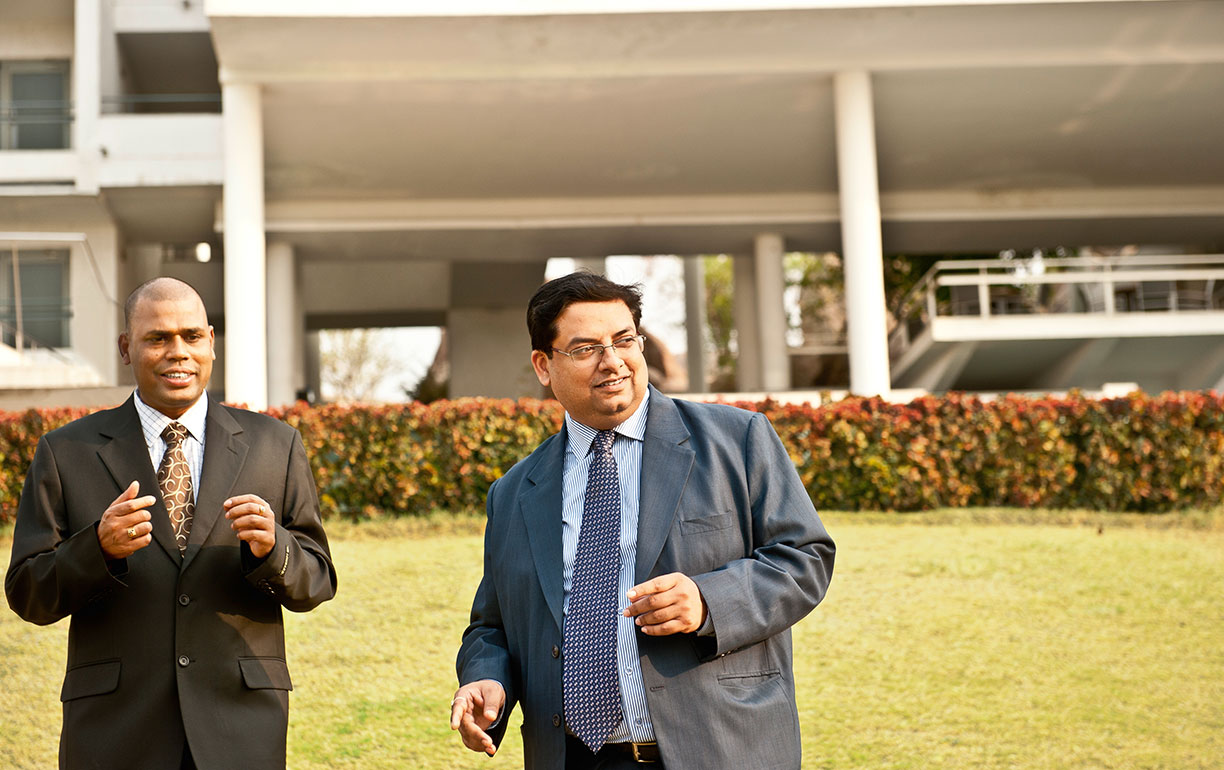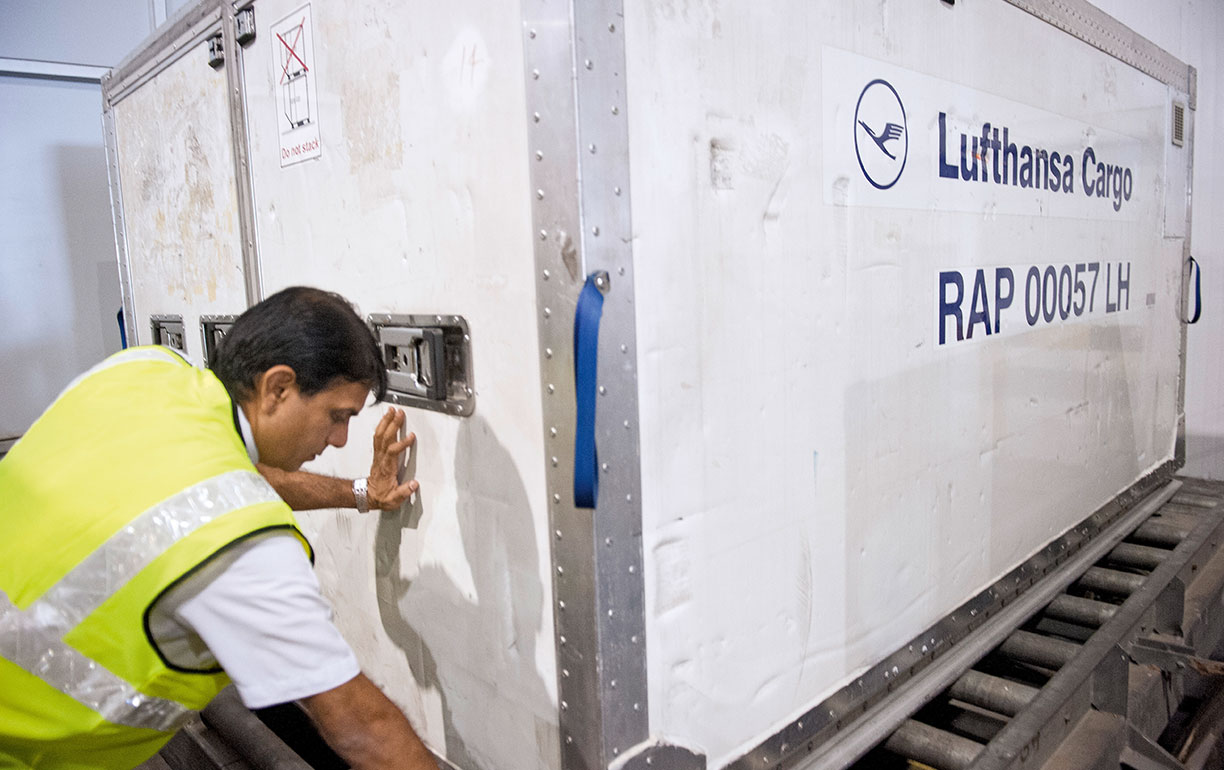
Cool connection.
India accounts for a large part of the world’s generics production. One of the leading manufacturers is Dr. Reddy’s Laboratories from the pharmaceuticals hub Hyderabad. For years, the company has entrusted Lufthansa Cargo with the transportation of temperatursensitive freight.
Neon tubes bathe the hall in icy light. The temperature reading of 20.1 degrees Celsius on the digital thermometer is not exactly Arctic. The outside temperature at Hyderabad Airport in the Indian state of Andhra Pradesh, however, is over 37 degrees. Compared to that, the Pharma Zone reserved exclusively for medicines seems downright cool.
It is even more important that exactly the right conditions prevail in the hall for freight such as the total of 2.4 metric tons of capsules stored loosely in blue receptacles. Intended for use for patients with gastrointestinal problems, they must have an ambient temperature of between 15 and 25 degrees at all times. Only then is their full efficacy guaranteed. In a few hours’ time, the capsules will be loaded onto an MD-11 from Lufthansa Cargo as part of a shipment weighing 80 metric tons. A transport container will then ensure the correct and constant temperature: the Unicooler.
The capsules in the blue buckets come from the manufacturer Dr. Reddy’s Laboratories.
They will be flown in the MD-11 to Frankfurt for onward transportation from there to other destinations in Europe and in the U.S. Like many other companies in this industry, Dr. Reddy’s is headquartered just a few dozen kilometers from the airport. Hyderabad with its many million inhabitants ranks as India’s pharmaceuticals capital. With a revenue of two billion U.S. dollars (approximately 1.6 billion euros) in the financial year 2012, Dr. Reddy’s is one of the subcontinent’s biggest pharmaceutical companies. At the same time, it is one of the world’s most important manufacturers of generics. Global business with the equivalent of branded medicines, which are more affordable and have the same active ingredients as the branded originals, following the expiry of patent protection is booming. Indian suppliers in particular benefit from the growing demand in newly industrializing and developing countries but also in industrialized countries.

U.S., India and Germany in the focus of generics suppliers.
“Our key markets are the U.S., Russia, Germany, the UK and India,” says Dr. Ravi Prakash Mathur, who is responsible at Dr. Reddy’s for supply chain management and logistics. A focus in the company’s portfolio is on gastrointestinal and cardiovascular medicines as well as on diabetology and oncology.
Branded as well as no-name products are sold. Founded by Dr. Kallam Anji Reddy in 1984, the company today has about 15,000 employees, two thirds of whom are in India. Other manufacturing facilities are located in, among other places, Mexico and the U.S.

Dr. Reddy’s is represented in Germany by Betapharm Arzneimittel GmbH, which it acquired in 2006. In addition, the Indian company group and the German pharmaceuticals group Merck announced this year that they intend jointly developing what are known as biosimilars. “International revenues account for more than 80 percent of our business,” says Dr. Mathur. It is decisively important for the manufacturer therefore that the transportation of exports by air runs smoothly.

Ideal transport equipment: Unicooler and Opticooler.
Lufthansa Cargo makes exactly the right transport equipment available to ensure that this is done reliably: the gastrointestinal capsules and many other temperature-sensitive products are sent on their airborne journey in the Unicooler.
The temperature inside the freight container can be set at values between -20 to +30 degrees Celsius. An autonomous cooling system keeps the settings constant at all times. Neither heat of almost 40 degrees, as during the meeting with Dr. Mathur in Hyderabad, nor minus temperatures at any other location can have an adverse impact on the goods.
In addition, a further development is available in the form of the Opticooler. Instead of dry ice, the cooling system here uses compressors. Both container variants are used in the framework of the product Cool/td-Active.
Lufthansa Cargo can also rely on state-of-the-art infrastructure at the airport of the “pharma city” Hyderabad, via which Dr. Reddy’s has a substantial share of its exports shipped. The cargo area has only existed in its current form since 2008, and the Pharma Zone was first opened in 2011. Goods from around 20 medicines manufacturers are regularly handled here. In addition to the area for 15- to 25-degree products such as the gastrointestinal capsules, there is one for even more sensitive products, which have to stored and transported at temperatures between two and eight degrees Celsius. What is more, there is a sterile zone for each category.
Dr. Reddy’s is a key customer.
“Inside India, Dr. Reddy’s is one of our key customers,” says Lufthansa Cargo manager Koppireddy Venugopal Raju, who is responsible there for this company. “And here in Hyderabad in particular, Dr. Reddy’s is the biggest customer in terms of tonnage.” In 2011, a total of about 1,500 metric tons was transported for the manufacturer, and there has been an upward trend year on year. “Lufthansa Cargo is one of our most important carriers,” Dr. Mathur confirms. The business relationship, which has existed since 2004, also often includes the transportation of time-critical shipments and of products that have just been launched. “The quality and efficacy of our medicines must be 100 percent – and that includes the absolute reliability of storage and transportation,” Dr. Mathur explains. “And Lufthansa Cargo has a sharp awareness for our requirements.
Photos:
Sanjay Austa
|
In addition, a further development is available in the form of the Opticooler. Instead of dry ice, the cooling system here uses compressors. Both container variants are used in the framework of the product Cool/td-Active. Lufthansa Cargo can also rely on state-of-the-art infrastructure at the airport of the “pharma city” Hyderabad, via which Dr. Reddy’s has a substantial share of its exports shipped. The cargo area has only existed in its current form since 2008, and the Pharma Zone was first opened in 2011. Goods from around 20 medicines manufacturers are regularly handled here. In addition to the area for 15- to 25-degree products such as the gastrointestinal capsules, there is one for even more sensitive products, which have to stored and transported at temperatures between two and eight degrees Celsius. What is more, there is a sterile zone for each category. |
Dr. Reddy’s is a key customer. “Inside India, Dr. Reddy’s is one of our key customers,” says Lufthansa Cargo manager Koppireddy Venugopal Raju, who is responsible there for this company. “And here in Hyderabad in particular, Dr. Reddy’s is the biggest customer in terms of tonnage.” In 2011, a total of about 1,500 metric tons was transported for the manufacturer, and there has been an upward trend year on year. “Lufthansa Cargo is one of our most important carriers,” Dr. Mathur confirms. The business relationship, which has existed since 2004, also often includes the transportation of time-critical shipments and of products that have just been launched. “The quality and efficacy of our medicines must be 100 percent – and that includes the absolute reliability of storage and transportation,” Dr. Mathur explains. “And Lufthansa Cargo has a sharp awareness for our requirements. |
Photos:
Sanjay Austa
